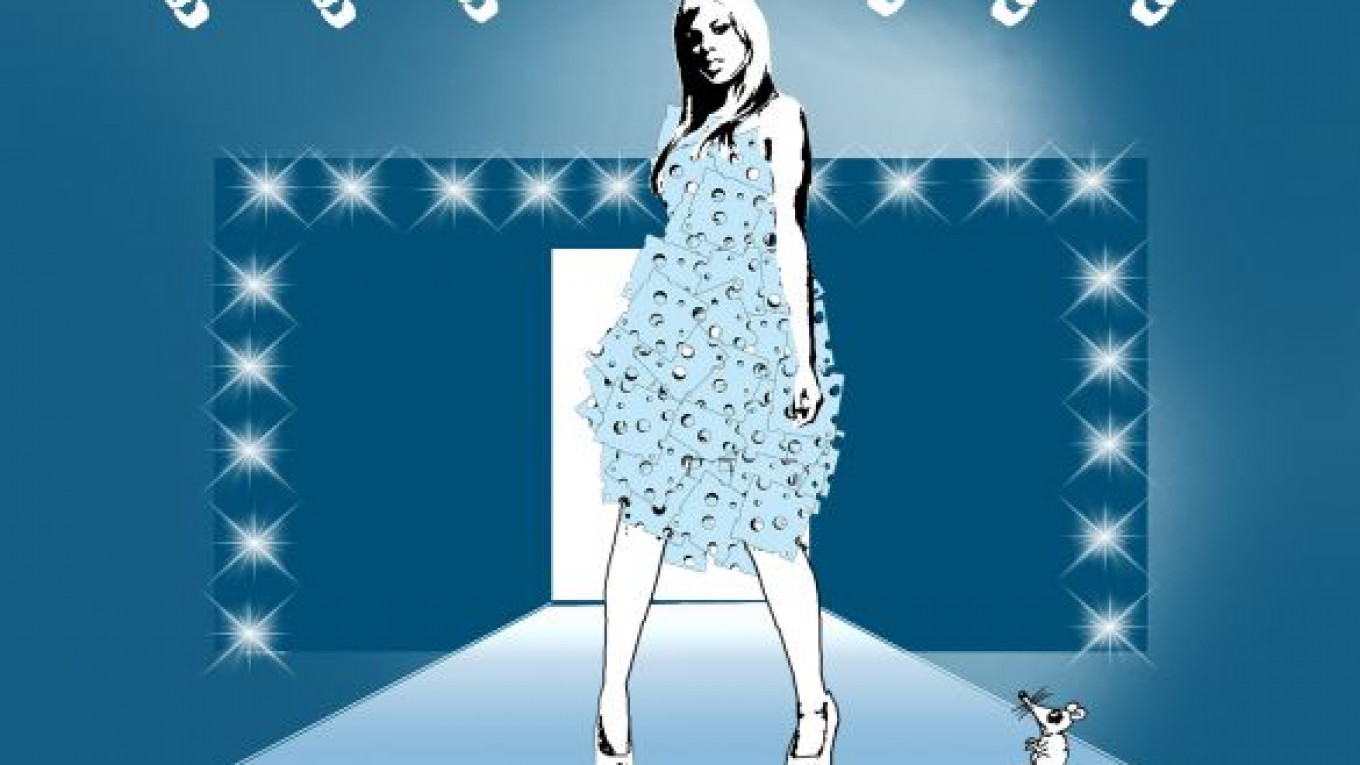This week, Russian MTV started “Project Podium,” its homegrown version of the U.S. hit show “Project Runway,” where young designers compete to create the best outfit and show it on catwalk models.
The fun of the show is seeing the bitchy contestants labor over their bizarre outfits with sweatshop hours. Unlike most reality shows, it does actually require some skills — sewing for a start, which impresses me anyway.
The U.S. version stars doll-faced model Heidi Klum as one of the judges, curtly condemning terrible outfits and eliminating the offenders. Perhaps she will make an appearance on the Russian show, although her husband, British singer Seal, misstepped recently with a performance at Ramzan Kadyrov’s birthday celebrations. Seal justified himself in an ill-judged Twitter message, insisting he was playing for the “Chechenyan people.”
The Russian version is hosted by Anna Sedokova, a former singer in the VIA Gra girl group, known for its minimal amount of clothing. A pinup favorite, she was described as the “most stylish presenter on national television.”
The winner gets to show a collection at one of Moscow’s fashion weeks and to design a capsule collection for Bosco Sport, as well as have a fashion shoot in Russian Elle magazine, whose editor is one of the judges.
The Russian contestants are a real mixed bag, coming from all over the country, with two from Vladivostok alone, and one from Belarus. The first show introduced the most one-dimensional character, Olga from the famed textiles city of Ivanovo, a dizzy blonde who thinks Vladivostok is in the north and loves pink. Then there were the cool people. Dima from Omsk has little braids and designer stubble. “I’m not interested in these people,” he said of the other contestants. But he made an exception for Dasha Dee-Dee, a slim nightclub dancer, who explained she did not want to be eliminated because her flat has just burned down.
The first competition was to design an outfit from materials bought at the Carousel hypermarket. Contestants dashed around with trolleys and a budget of 3,000 rubles ($95.50), provoking some confusion among shoppers. “You should get a LCD television,” one suggested.
The weirdest choices were by Belarussian Dima, who piled his trolley with slices of processed cheese, and Muscovite Anton, who bought plastic cups. Others went for more manageable options such as plastic wrap and aluminum foil, while the cool Dima examined the chili section.
The contestants had to work till midnight, cue frazzled nerves. But somehow they managed to get something on the catwalk models in the end, and it is was impressive how the models managed to make the outfits look passable.
The voice of reason on the show seemed to be Elle editor Yelena Sotnikova, who questioned the designers about the wearability of their outfits. Yorgas from Sochi showed a dress that was basically just green twine and flowers. “You could only wear that dress in a forest,” she said. Another designer said she created a minimalist structure of coat hangers to show urban isolation, prompting the response: “I’ve lived in a metropolis quite a long time and I’ve never felt like this.” And she shuddered in horror at a designer who made a dress of mats tacked together with string, saying: “I’m very afraid of patchwork.”
In the end, the bizarre cheese dress got through — although it lacked geometry, apparently — and Anton cut up his plastic cups into sequins for a highly praised shimmering 1950s-style number. The overall prize went to a minimalist white dress scattered with salt crystals, and the coat-hanger girl tearfully went home.
A Message from The Moscow Times:
Dear readers,
We are facing unprecedented challenges. Russia's Prosecutor General's Office has designated The Moscow Times as an "undesirable" organization, criminalizing our work and putting our staff at risk of prosecution. This follows our earlier unjust labeling as a "foreign agent."
These actions are direct attempts to silence independent journalism in Russia. The authorities claim our work "discredits the decisions of the Russian leadership." We see things differently: we strive to provide accurate, unbiased reporting on Russia.
We, the journalists of The Moscow Times, refuse to be silenced. But to continue our work, we need your help.
Your support, no matter how small, makes a world of difference. If you can, please support us monthly starting from just $2. It's quick to set up, and every contribution makes a significant impact.
By supporting The Moscow Times, you're defending open, independent journalism in the face of repression. Thank you for standing with us.
Remind me later.






